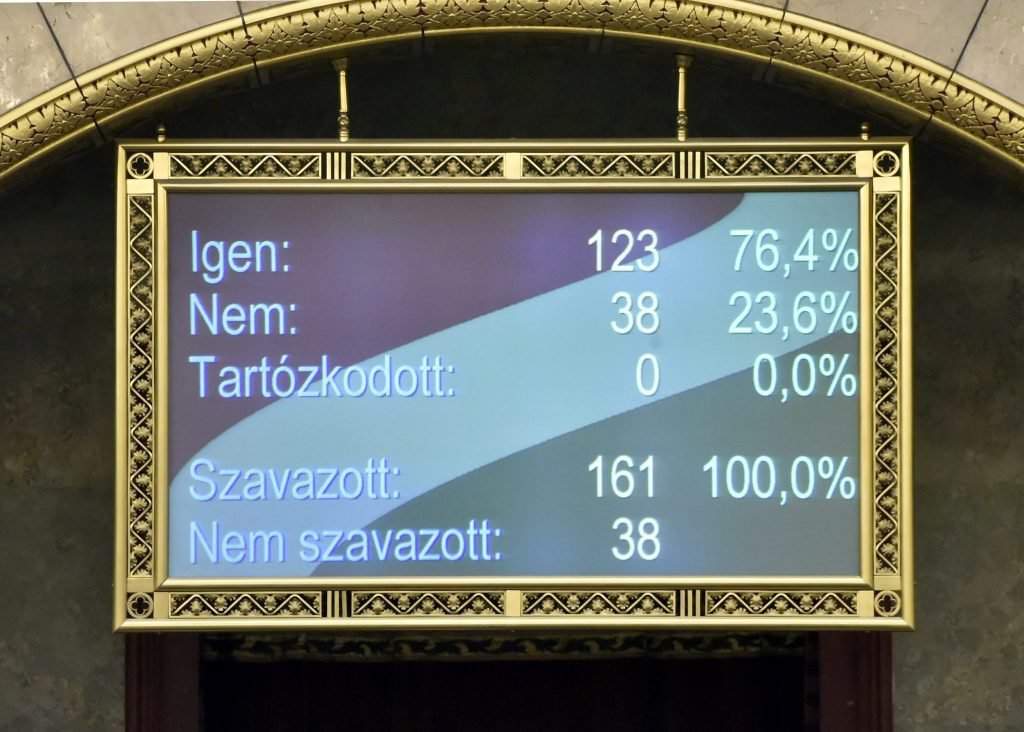Change language:
It’s over! Hungary’s parliament amends higher education act againts foreign universities – UPDATE

Budapest, April 4 (MTI) – The bill regulating foreign universities in Hungary, which is to be voted on by lawmakers on Tuesday in a speeded-up procedure, serves the interests of the country and all its citizens, the minister of human resources said before the debate of the bill.
The proposed legislation is easy to comply with and “creates equality instead of privileges”, Zoltán Balog said.
It is in the country’s interest to have as many autonomous, internationally acknowledged higher education institutes as possible, enriching Hungarian science. But it goes against Hungary’s interests to host experiments “aimed at undermining the elected government or leadership”, Balog said. The “faux NGOs funded by George Soros” are just such agencies, Balog insisted, adding that “we are adamant about obstructing their activities by any lawful means.”
The university registered and accredited in Hungary under the name “Közép-európai Egyetem” is fully acknowledged by the Hungarian government, he said, drawing a distinction between this and the “Central European University” accredited in New York but which has no campus there.

The Hungarian government is ready to talk to the government of the United States or to the leadership of the federal State of New York, where the CEU is registered in the US, Balog said, to take steps towards signing an inter-state agreement which would bring the university into compliance with Hungarian regulations.
Balog called widely spread claims that the freedom of education is under threat in Hungary a “hallucination” and called it “lamentable” that Hungarian-born US billionaire George Soros, who founded CEU in 1991, should use his influence “to pressure the Hungarian parliament”. This puts the government at odds with “very powerful business circles”. “Let’s face it: education is, among other things, a business,” Balog said.
The Education Office conducts an audit of higher education institutes every five years, Balog noted. The 2016 audit uncovered a host of irregularities, many of which apply to the CEU, “which cannot presume to stand above Hungarian law”. The audit found 17 courses at the university which ran without having been registered, and the CEU has not had its programme accredited, he insisted. Neither has it submitted the required data to public registries. “The CEU itself does not know the exact number of its students”, he said.
Out of the 28 foreign universities operating in Hungary, 27 were found remiss in complying with some of the regulations, Balog noted. Irregularities included institutes with unclear legal backgrounds; the lack of a Hungarian partner institute; some actually were not entitled to give university courses or award degrees or were not accredited as an institute of higher education in their home countries, Balog said.
The Liberal Party said the proposed legislation was damaging because, far from George Soros floundering, it would be Hungary and Hungarian society that would lose out. The move would put Hungary in a bad position in the international community, a party representative said, noting that the Alliance of Liberals and Democrats for Europe (ALDE) had asked the European Commission to examine the proposed Hungarian laws on civil organisations and higher education to see to what extent they violate the EU’s founding treaty and the European Charter of Fundamental Rights.
At a press conference held in front of the CEU building in Budapest, the Liberals’ spokesman for foreign affairs, Istvan Szent-Ivanyi, said he trusted that President Janos Ader would take heed of one of his predecessors, László Sólyom, who expressly condemned the proposed legislation. He said it was hopeful that the Constitutional Court would also “make the right decision” on the matter.
Parliament amends higher education act
Hungary’s parliament on Tuesday approved amendments to the act on higher education that will require foreign colleges and universities in Hungary to operate under an intergovernmental agreement and to have a campus in the country in which they are based. The bill was passed in a speeded-up procedure with a vote of 123 in favour and 38 against. There were no abstentions.

The Central European University (CEU), which is accredited in the United States but has just one campus, in Budapest, earlier said the changes to the law would make its continued operation in Budapest impossible. The CEU called the proposed legislation “discriminatory” and said that it “targets CEU directly”.
Prime Minister Viktor Orbán on Monday said there was “no reason for anybody to be nervous” as the Hungarian government would hold talks with the government of the United States on the matter of the CEU. “The Hungarian government will be guided by goodwill as will most certainly the government of the United States of America,” he added.

A last-minute change moved forward the date for revoking the licences of institutions that fail to comply with the new rules to January 1, 2018 from September 1, 2018.
About 10,000 people protested the amendments in Budapest on Sunday, according to the demonstration’s organisers. A number of Hungarian and foreign academics have also voiced their opposition to the changes.
The opposition Socialists voiced full support for the CEU and called on President János Áder not to sign the amendments.
Socialist group leader Bertalan Tóth told a press conference that the new legislation was equal to a “base and petty-minded assault” aimed at curbing the freedom of education through “executing” the university. Should the Socialist Party win next year’s elections, he said, it would repeal the amendments, he added.
The green opposition LMP said they would appeal to the Constitutional Court against the new “lex CEU”. In a statement, co-leaders Bernadett Szél and Ákos Hadházy wrote that the law was “unacceptable and harmful” as well as anti-constitutional. The Együtt party said it would file a similar appeal with the president.
The Leftist opposition Democratic Coalition (DK) said it would submit a referendum initiative to prevent CEU from closure. DK deputy leader Ágnes Vadai told a press conference that parliament’s passing the amendments was a “clear and unmistakeable attack against education, academic life and the future of Hungary’s youth”. She also called on other parties and civil groups to support DK’s referendum.

UPDATE
Foreign ministry summons US, German charges d’affaires
The foreign ministry has summoned the heads of the US and German embassies in Budapest in connection with higher education amendments passed earlier on Tuesday, the ministry told MTI in a statement.
The ministry said that “all higher education institutions in Hungary shall abide by relevant regulations”, adding that “the legislation passed today is exclusively aimed at that; any claims to the contrary are false”.
Photo: MTI
Source: MTI







